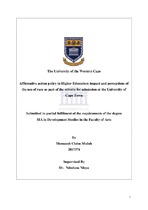Affirmative action policy in higher education: impact and perceptions of the use of race as part of the criteria for admission at the University of Cape Town
Abstract
After the first democratic election in South Africa in 1994, the new democratic government harnessed all its resources towards establishing a non-racial society based on a constitution that embodies equal rights. One of the enduring legacies of apartheid is the extreme socio-economic disparities that emerged in the South African society. Higher education in the context of South Africa is also a means of bridging the inequality gap created during the colonial and apartheid periods (Reddy, 2004). Moreover, apartheid education, as with other sectors of society was racialised in favour of whites creating a drought in skills within the other race groups. The need to establish an equitable and efficient higher education thus became one of government’s pivotal priorities. The adoption of affirmative action policies that have prioritised university access by underprivileged black students has been pointed to as one of the means to address racial inequalities in education. The thesis postulates that that the use of race in implementing affirmative action policy is neither a sufficient means to, nor an end of, redressing the ills of apartheid. Through qualitative and quantitative methods, the present study analyses the impact of affirmative action policies at the University of Cape Town (UCT) and gauges the level of transformation as a result of the use of race as a proxy for admission into UCT. The study examines the equality of access and enrolment of first time entering undergraduate students into UCT through race based admission. Despite government and institutional (for example UCT) efforts to pursue a transformatory agenda, affirmative action policies continue to cause ruptures both within university communities and beyond. This research is going to use both quantitative and qualitative designs. The quantitative approach will be used where necessary – such as in reviewing racial split of enrolment over time – to glean on the figures. Such figures will however not be generated by the study itself but from officials from UCT. On the other hand, the qualitative approach will be used through the analyses of debates occurring in the UCT community in order to gauge perceptions on the policy.

